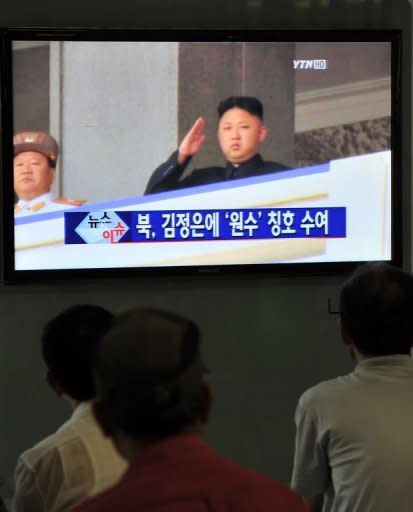N. Korea to 'completely review' nuclear issue
North Korea said Friday it had no choice but to "completely review" the nuclear issue after accusing the United States and South Korea over a plot to blow up a statue of its founding leader. The foreign ministry did not elaborate on what was meant by a review, but it will add to concerns Pyongyang may be planning to conduct a third nuclear test following its failed rocket launch in April. Last month the North said it had no plans "at present" to conduct such a test. The threat of a nuclear review came after the North arrested a man who was allegedly trying to blow up a monument to Kim Il-Sung, an act which the foreign ministry described as a "war action as serious as the armed invasion". Pyongyang claimed South Korean intelligence authorities had hired him to carry out the plot and that Washington was actively involved. "The consistent hostile policy towards the DPRK (North Korea) pursued by the US is giving rise to the evil cycle of confrontation and tensions on the Korean Peninsula, making the prospect of denuclearising the peninsula all the more gloomy," the foreign ministry said in a statement released by the official Korean Central News Agency (KCNA). "The situation compels us to completely review the nuclear issue." The statement said the plot ran counter to a 2005 deal under which Pyongyang agreed to dismantle its nuclear programme in return for economic and diplomatic benefits and security guarantees. Six-party talks on implementing the deal have been stalled since December 2008. "This is a message urging Washington to change its pressure and hostile policy towards Pyongyang," Yang Moo-Jin of the University of North Korean Studies, told AFP. "North Korea is not expected to translate its threat into action for a while. But it is saying it can take action if the United States continues to ignore its calls." The official position of the North, which has been developing nuclear weapons for decades, is that it needs them for self-defence against a US nuclear threat, but that it is willing in principle to scrap the atomic weaponry. In 2006 and 2009 the North reacted to UN sanctions imposed following rocket launches by carrying out nuclear tests. Seoul Friday confirmed the man who was arrested in the North was a defector who had settled in the South. Jon Yong-Chol was presented at a press conference in Pyongyang Thursday where he said he had been promised handsome rewards from South Korean agents if he succeeded in his mission. Jon, in his early 50s, claimed he had been recruited by agents after settling in the country, KCNA reported, an allegation flatly denied by the South's National Intelligence Agency. According to KCNA he said he twice visited China's northeastern city of Yanji -- in March and May this year -- where he was taught by South Korean agents how to use an explosive device that could be set off by mobile phone. He was arrested last month after entering an unspecified North Korean city near the Chinese border in an attempt to familiarise himself with the site of a statue dedicated to Kim Il-Sung. The South's Unification Ministry confirmed Friday that Jon was a former defector, who arrived in the South in 2010, but described his allegations as "groundless propaganda". On Monday Pyongyang accused South Korea and the United States of using defectors to destroy statues and monuments dedicated to its late leaders. More than 23,500 refugees have settled in the South since the 1950-53 Korean War. The North customarily describes defectors to the South as "human scum" who betrayed their country. North Korea, whose personality cult surrounding its ruling family is like a state religion, has built numerous monuments for its late founding leader Kim Il-Sung who died in 1994 and his son Kim Jong-Il who died last December. In April two giant statues of Kim Il-Sung and Kim Jong-Il were unveiled in Pyongyang, just hours after the North's failed rocket launch. The foreign ministry statement comes after Kim Jong-Un was named as Marshal of North Korea this week, amid a reshuffle of senior figures seen as a means of cementing his grip over the 1.2-million-strong military.




